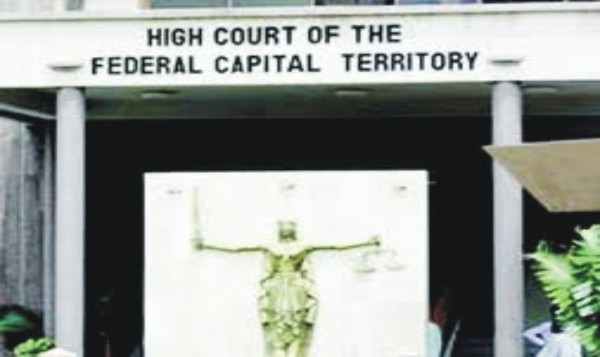By Nath Onyeukwu, 08037129866
IN THE YEAR before Nigeria’s independence on first of October 1960, a conference of the International Commission of Jurists was held in Lagos. At the conference of eminent international jurists and practicing lawyers of the world, “individual liberty or freedom” dominated the discussions. Almost all the papers presented at the conference touched either in the main or in passing mention, on the issue of individual liberty. At the end of the conference, the world jurists came up with a communiqué now commonly referred, to as “The law of Lagos” which was to be of universal legal application.
The “law of Lagos” confirmed and strengthened in this country, the British (Nigeria’s former colonial masters’) maxim in law on the presumption of innocence of an accused person, until his guilt is proved, — not only proved, but proved beyond all reasonable doubt. That law condemns the trumping up of charges against citizens under any pretext. The law enforcement agencies are forbidden to indulge or allow their personnel to indulge in such a reprehensible act. The judiciary was to watch-out for such acts and move against any attempt, by just about anybody, no matter how highly placed, to mislead the courts directly or indirectly into conclusions that will enthrone “justice that is NOT seen to have been done”.
Fifty-three years after the “enactment” of this social and law professional guidelines for civilized administration of justice and law practice in this country, the justice system has continued to plummet into the declivity of putrefaction in practice and application of the principles of the law. And despite the Nation’s acclaimed provisions of Fundamental Objectives and Directive Principles of State Policy (Chapter 2) of the 1999 Constitution of the Federal Republic of Nigeria (which, however precludes any judicial inquiry into its compliance or otherwise) and the fundamental rights of the citizen, encapsulated in (chapter 4) Section 35 of the 1999 constitution (as amended), our courts and the police still regard granting of bail to accused persons as a privilege and NOT a right.
This appears to be encouraged by the fact that the law leaves granting of bail at the utter discretion of the bench. However, this discretion is not expected to be exercised in a manner that is inconsistent with the intendment of the constitution of Nigeria. It is a discretion that ought to be exercised under the law (of facts and truths) placed before the court. In the case of any doubt, the discretion is expected to be exercised in favour of the citizen, after all bail entails the provision of a reliable credible and authentic surety.
What do we have of this situation today. Application for bail which used to be oral, except in offences under capital punishment, must now take the form of a written application by motion for bail. This must be served on the prosecution 48 hours (two days) to the next hearing date. And the next hearing date could be weeks or months depending on the convenience of the court. Again on the new date, the submissions are adopted by the counsel and yet another adjournment to a date for the argument before the court. After this, the court may (and in most cases) adjourn to another date convenient to the court for ruling. All this time — days, week or months, the accused person (who perhaps is a victim of trumped-up charges) is languishing in jail! What a travesty of justice in a twenty first century Nigeria!! What a primitive administration of justice in a nation that lays claims to modern civilized judicial system in which the liberty of the citizen is guaranteed!!! This is a clear negation of the related provisions and intendments of the Nation’s supreme law, and by implication, The law of Lagos.
However, it must be admitted that the appellate courts the Federal Courts of Appeal and the Supreme Court of Nigeria — have always insisted that bail is of RIGHT to accused persons. The weakness of this stance is that judges who adopt an unnecessarily elongated system or refuse bail and/or detain accused persons without careful consideration of the circumstances of the particular case, are never queried by any superior. Nigerian citizens are just left to the whims and caprices of the bench which at times act on the wrong side of equity.
It must be stated here that to sit in judgment over the affairs of fellow men is an attribute of God. And, any human system that is not subject to supervisory checks is susceptible to abuse and decay in the exercise of power and authority, not the less in the Nigerian society, characterized by various forms of impropriety, corruption, unbridled exercise of power and arrogant application of authority.
In the two decades immediately following Nigeria’s attainment of independence, the Nigeria Police conducted the prosecution of criminal cases in the Magistrate’s Court. Any case beyond the jurisdiction of the Magistrate’s Court, was subjected to a Preliminary Investigation/Inquiry (PI) into the charge by the Magistrate sitting as a Court of First Instance. If this court finds that a prima facie case has been established, the matter is then taken to high court. And if the matter is a bailable offence, that is, not a matter involving section 319 of the criminal code (murder) the magistrate’s court admits the accused to bail on terms stipulated by the court. The case is then referred to the Department of Public Persecutions of the Attorney-General’s Office for further action.
But in recent times, the Nigeria Police Force now has lawyers in its service (mostly policemen and women who read law out of the formal university campus and lecture rooms) who now handle the prosecution of cases. This would have been a commendable advancement in the Nation’s justice system, but for its unfortunate festering into, not only a curse on the system, but a damnable placing of round pegs in square holes. All over the civilized world, lawyers are trained never to lie to, nor mislead, the court, which is often referred to as the “Temple of Justice” (hence lawyers are also addressed as “learned gentlemen”). With Police-lawyers, this honour seems to have no relevance for they appear neither “learned” nor “gentlemanly” because of their general corrupt nature under which most of them degenerate to the base level of shamelessly lying to the court without due regard for the “wig”.
Most of the time and in most of the cases, these law practice misfits, in the court rely on the cliche “information received” or “we are informed” to back-up their lies and make no further effort to prove the “information received”. It is most unfortunate that some judges buy-in into such information from the bar and allow this “non-evidential hear-say” to influence their decisions. Admittedly a judge is a human being with all the natural propensities of a rational vipet, but the bench should always; not only reticently reject such inadmissible information, but must condemn it openly. This will help to restore confidence in the bench as an institution that does not brook legal impropriety. On a judge failing to do this, even if his decision is silent on the false statement inflicted on the court, and rests on other points of fact and the law, the prejudice instilled in those concerned remains indelible and continuously erodes confidence in the Nation’s judicial system. Would such be seen as justice that has been seen to have been done?
The Federal High Court has parallel jurisdiction with the State High Court, being a Court of Superior Record, but the Magistrate’s Court is one of the courts of inferior records, and may not handle cases classified as felonies. As stated earlier herein, the Magistrate’s Courts before 1974, conducted Preliminary Inquiries/Investigations (PI) into felonies to determine whether a prima facie case exists in a felonious charge. If it does, the matter is referred to the High Court with all the evidence available or tendered at the P.I. The same is placed on the accused person who is admitted to bail (if the offence is bailable) to enable him to have clear knowledge of his offence and prepare his defence.
The P1 system was abolished in 1974, but in matters going before the State High Court, the police in non-capital offence matter; and the Department of Public Prosecutions of the Attorney General’s Office in case of capital offence; make all the prosecution evidence available to the accused person including all evidence given and documents to be tendered against him at the trial, to enable him to have a clear information of the case against him and prepare his defence. In this process nothing is left to surprise. (It is very strange, that this process is not adopted by the Federal High Court which is also a court of superior record. An accused person is arraigned before a Federal High Court without any details of his offence, no matter how serious. He just pleads to the charge he knows little or nothing about the case and evidence against him). THIS IS NOT ONLY VERY RIDICULOUS! but reduces the Federal High Court to some thing of a court of “First Instance” or Inferior Record. Thus proclaiming the clamour for a change to a well grounded jury system in place of the single judge Federal High Court System.
Nigeria’s much vaunted civilized justice system is gradually but steadily festering unto irretrievable decay (just the same way and process, corruption crept into the country’s body politic and is now almost impossible to eradicate) and unless some drastic general reforms are initiated now, it would putrefy to an intractable level. In this, the National Assembly, the National Judicial Council (NJC), the Nigerian Bar Association (NBA), the Attorneys-General in the Federation of Nigeria, the various universities that offer law studies including the Nigerian Law School, the office of the Inspector-General of Police, some renowned private lawyers, psychologists and criminologists, should now be assembled together to farthom a civilized criminal justice process for crime trails, to stem the tide of fast putrefaction of the Nation’s criminal justice system.
Our constitution provides for respect for human dignity, yet men awaiting trial remanded in prison custody are subjected to inhuman conditions and denied clean and neat dresses and footware, even when coming to court. No regard is given to the status and nature of their “offence”. They are more often than not cuffed and leg-ironed even for non-violant crimes. This is making nonsense of section 34(1) of Nigeria’s Supreme Law which states clearly that: “every individual is entitled to respect for the dignity of his person and accordingly. (a) no person shall be subjected to torture or to inhuman or degrading treatment” this inhuman degrading treatment silhouetted on the background of the presumption of innocence of an accused person until his guilt is proved beyond all reasonable doubt vis-a-vis what actually obtains, portends unacceptable primitive administration of justice which must be deprecated. This is not the case in our system. So where is this claim justified in a system which permits accused persons (Nigerian citizens) to be thrown into prison and denied bail. The police demand several thousands of Naira as bribe to grant bail. In the court, officials, perhaps without the knowledge of the judge, demand bribe to perfect the bail of accused persons who had been granted bail by the court. Complaints to superiors avail nothing, but displeasure against the man who complains. In the Court, the police ignore the fact that bail is a RIGHT and not a privilege, and oppose bail for the fun of legal histrionics. And most of the time on false unsubstantiated allegation. Some judges fall easy prey to this falsehood. Again where is the respect for, even, the democratic principles which must apply to the Nation’s Justice system the bulwark of our DEMOCRACY when those who operate the system the bench, the official bar and the police are so high-handed and behave as if they possess the supreme powers of the Creator of the universe, that must be deified to obtain justice the citizen’s inalienable right — from them, in contradistinction to the provisions of the Nation’s Supreme Law.
The Federal High Court operates a system inimical to the dignity of citizens of Nigeria, where bail is granted to accused person, it takes over seven days to two weeks or more to secure the release of the accused person from prison; because the requirements, even though they appear simple, but are extremely cumbersome and in some cases unattainable. For an example, the court grants bail in the sum of one million Naira and one surety in the like some, the surety to provide Affidavits of Means, and Residence. The Registrar to verify the averments. The system demands two (2) separate affidavits. The Affidavit of Means which should indicate the financial status of the surety, must be loaded with, such facts as the relationship with the accused, their residential places. The original copies of all documents such as C of O; Certified True Copies signed by officials permitted by law to endorse such, are not accepted. This is very strange because section 104 of Evidence Act (Amended 2011) makes such copies admissible in law.
Another Affidavit of Residence must be sworn to, repeating almost the same facts contained in the Affidavit of Means in addition to the place of birth of the surety and that of the accused person; and promise to produce the principal party whenever required for trial and a declaration making the surety liable to pay the bail sum in case of bail jumping. Then the bailiff will at his convenience visit the places of residence and business of the surety in verification. And at the bailiff’s convenience, he writes his report to the Registrar, who then forwards a minute to the Judge who may then approve the release from prison of the accused, and returns to the Registrar, after which a bail bond is issued, and a reproduction warrant is then issued to the prison authorities to produce the accused person for release. These take a minimum of ten days after the court had granted bail. As a result a large number of people granted bail remain in prison custody for more than two months awaiting for their release on bail granted.
What a system of official inhumanity to man, in the name of due process of the law! What members of the NJC and the Chief Judge of the Federal High Courts must realize is that with due deference to the Constitution of Nigeria, it is a travesty of any modern legal system to reject a duely certified true copy of a document .Section 146 of Evidence Act (2011) clearly states that “The Court shall presume every document purported to be a certificate, certified true copy of other document ….. duely certified by any officer in Nigeria who is duely authorized in that behalf, to be genuine ….” It beats understanding why a Registrar of a Federal High Court should act in defiance of the Nation’s law of Evidence. What capacity has a Court Registrar to keep the original of a citizen’s Property Deed or other documents that are not subject to court proceedings, just to process the bail papers of an accused person. This is beyond legal circumspect of the rule of law, it is a degeneration to an intolerable level of insult on the citizenship of this Nation. To say the least, it is a repressive regulation that runs contrary to democratic norms, human rights and therefore the intendment of the constitution of Nigeria and the Rule of Law. If a man jumps bail such a person should be dealt with according to law, and not to visit the entire law abiding masses of this country with such draconian regulation. It is reprehensible, unfair, unacceptable and punitive.
The foregoing, and, many more examples and issues, space does not permit to be raised in this discourse, demand on the institutions mentioned here-in-earlier in this discourse to do Nigeria a patriotic duty without much delay, of rising in defence of the Nation’s Supreme Law by undertaking serious reforms that will ensure open and apparent checks on the disregard of its provisions in respect of the fundamental rights of the citizenry, even orders of the courts must be seen to have been made with due regards for the Rights, Liberty and Dignity of the individual; and that the prison laws and regulations do not encourage dehumanizing and degradation of individuals, and not the less with regard to the police.
This has become an urgent necessity that cannot be wished away nor pretended not to be existing, it is generally accepted the world over, that judicial high-handedness or injustice breeds insurrection and anarchy. Nigerians are getting indeed, fed-up with the present situation.











